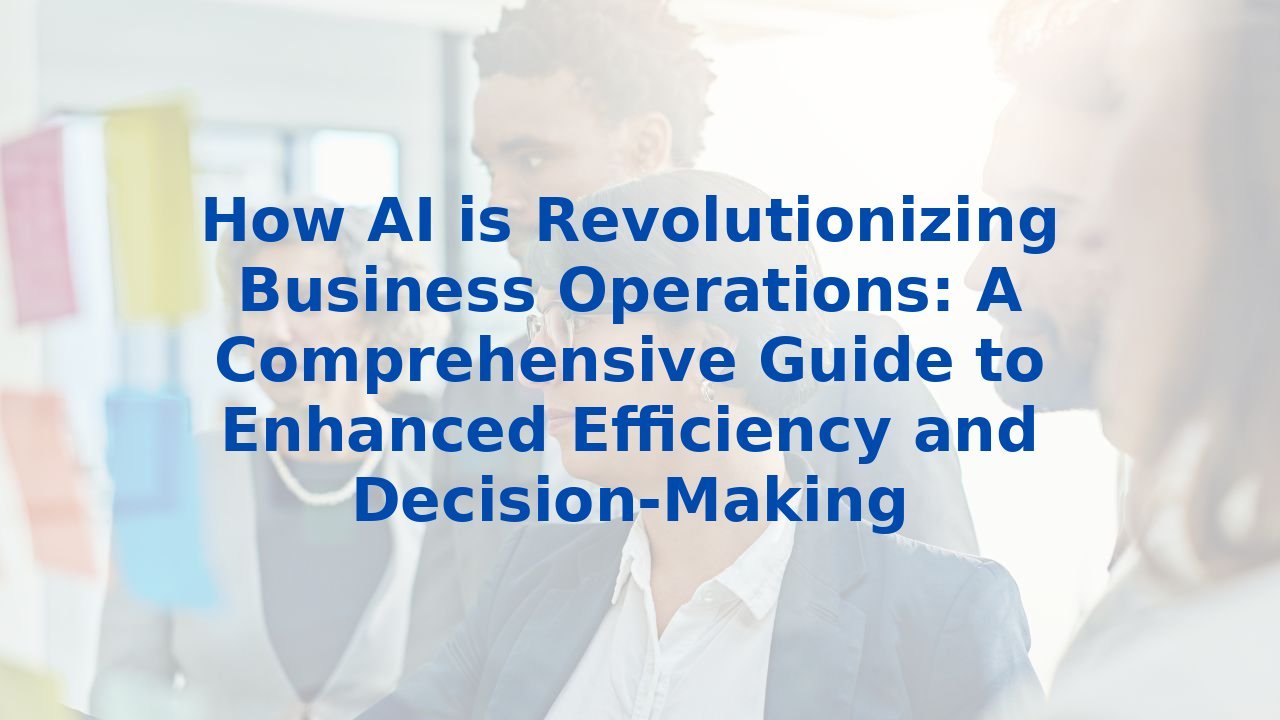How AI is Revolutionizing Business Operations: A Comprehensive Guide to Enhanced Efficiency and Decision-Making
How AI is Revolutionizing Business Operations: A Comprehensive Guide to Enhanced Efficiency and Decision-Making
In the ever-evolving landscape of business, adaptability is key. Organizations are continuously searching for innovative methods to elevate efficiency and sharpen decision-making. Enter artificial intelligence (AI)—a game-changer that is redefining the operational frameworks of countless enterprises. This guide explores how AI optimizes key business processes, enhancing everything from meetings to product development, while also emphasizing the importance of training employees in AI methodologies.
1. Transforming Meetings
Meetings are necessary yet often encumbered by time-consuming administrative tasks. AI simplifies this by automating tasks such as scheduling and summarizing key discussions. Imagine walking into a meeting where AI tools automatically transcribe discussions and flag actionable points. By streamlining these processes, organizations can ensure that critical insights are captured, effectively mitigating loss of information and saving precious time.
2. Elevating Sales and Marketing
The integration of AI analytics into Customer Relationship Management (CRM) systems empowers sales teams to focus their efforts on high-value clients. With predictive insights, teams can strategize their interactions, directing their energy where it's likely to yield the highest returns. Moreover, chatbots have emerged as invaluable assets, providing real-time assistance to customers and significantly boosting sales potential. The impact is profound—enhanced efficiency translates directly to revenue growth.
3. Enhancing Customer Service
When it comes to customer service, AI shines by automating routine inquiries and analyzing service interactions. Advanced AI solutions can evaluate support calls with remarkable accuracy, identifying areas needing attention and optimizing overall service quality. This not only elevates customer satisfaction but also provides key insights into process improvement, enabling businesses to refine their service delivery continuously.
4. Revolutionizing Product Development
AI introduces an innovative dimension to product development through generative design. By allowing designers to input parameters and goals, AI can generate a multitude of design alternatives, ensuring that the most effective and cost-efficient solutions come to the fore. This approach not only accelerates time-to-market but also fuels creativity, ensuring that organizations remain at the forefront of innovation.
5. Automating Content Generation
In an age where content reigns supreme, AI's capability to generate compelling content at scale is invaluable. With tools designed for efficiency, creating high-quality content becomes a streamlining process, allowing marketing teams to maintain a consistent brand voice without sacrificing quality. Automation in this sphere not only saves time but also guarantees that every piece of content meets established standards.
6. Streamlining Business Process Management
AI revolutionizes Business Process Management (BPM) through its prowess in simulation and optimization. By analyzing historical data, AI identifies patterns and possible bottlenecks, enabling organizations to proactively address inefficiencies. With real-time monitoring, potential delays and issues are identified swiftly, allowing for immediate corrective action. This vigilance enhances overall operational agility.
7. Supporting Complex Decision-Making
AI's ability to process vast amounts of structured and unstructured data is a powerful ally in complex decision-making. By simulating various scenarios, AI aids decision-makers in navigating through uncertainties with confidence. When organizations can visualize potential outcomes, they fortify their strategic planning, minimizing risks while maximizing potential impacts.
8. Automating Routine Tasks
Repetitive tasks demand attention but can drain resources. AI-driven automation tools, like Robotic Process Automation (RPA), take on these monotonous jobs, allowing employees to redirect their focus towards more strategic initiatives. This blend leads to greater job satisfaction, vital resource allocation, and enhanced operational proficiency.
9. The Importance of Employee AI Training
Despite AI’s robust capabilities, human intuition and expertise remain irreplaceable. Training employees to work alongside AI technologies fosters a culture of continuous growth. Here’s why it matters:
- Skill Enhancement: Empowering employees with AI knowledge ensures they leverage new tools efficiently.
- Informed Decision-Making: A trained workforce can extract meaningful insights from AI data, driving better business choices.
- Agility: Employees adept in AI technologies can better adapt to shifts in business processes, maintaining competitive edge.
- Collaboration: Promoting familiarity with AI fosters teamwork, with employees working synergistically alongside AI systems.
Conclusion
Artificial intelligence isn't just a passing trend; it has cemented itself as a cornerstone of modern business processes. From automating mundane tasks to enhancing strategic decision-making, the advantages of AI extend far and wide. As organizations embrace AI, it is crucial to invest in training employees to harness its full potential. By doing so, businesses not only enhance efficiency but also position themselves for long-term success. In this dynamic landscape, the interplay between human creativity and AI efficiency promises a brighter, more productive future.



